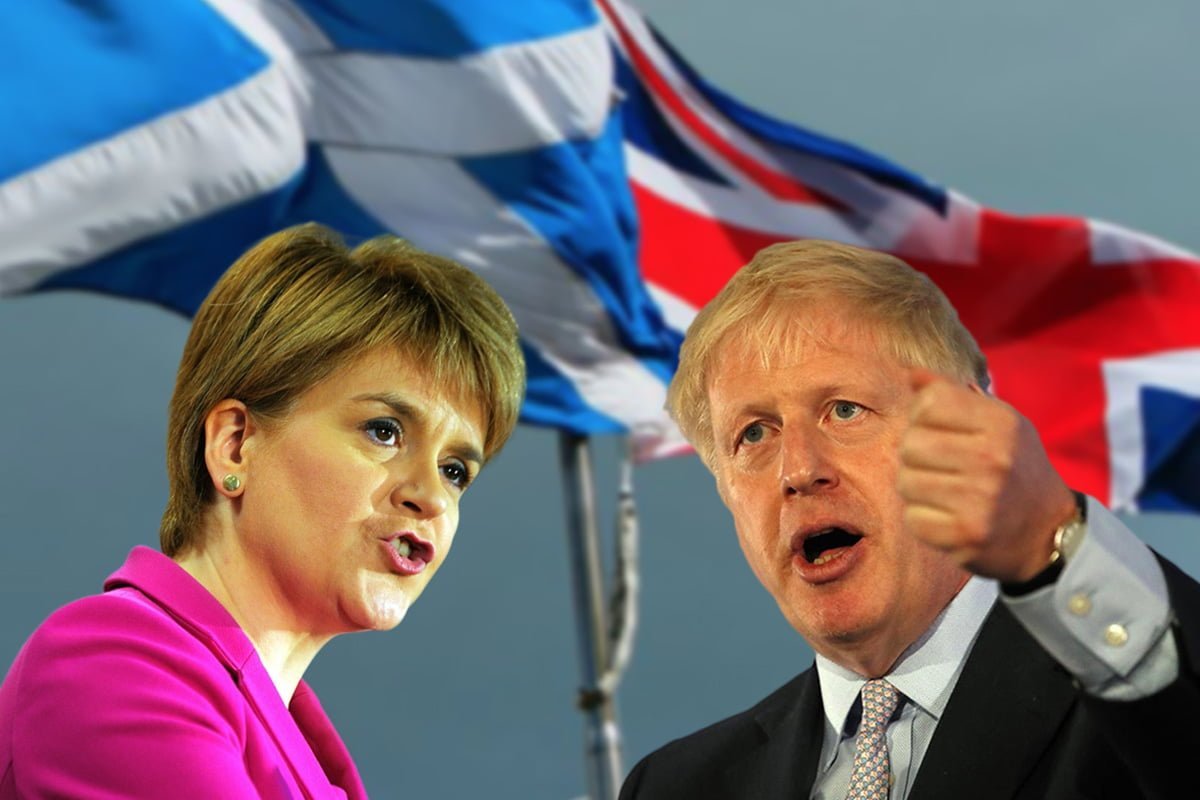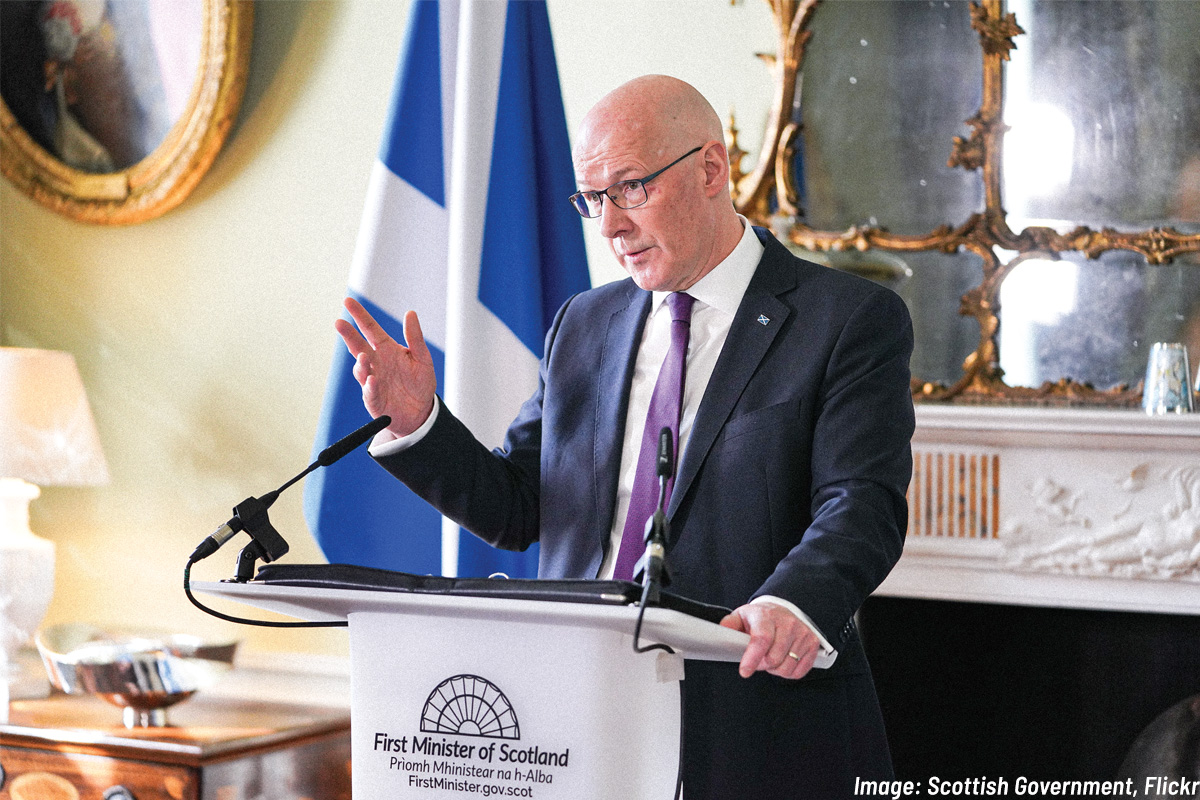Boris Johnson has again managed to pour petrol on the flames with his loose-tonged approach – this time by revealing his real thoughts about devolution. Rising support for independence is yet another thorn in the PM’s side.
The Prime Minister’s choice of words has landed him in hot water again. Recently, leaked reports from a meeting with Tory MPs reveal that he described Scottish devolution as a “disaster” and a “mistake”.
A spokesperson for Number 10 was quick to clarify that Johnson’s comments were really just a run-of-the-mill political attack on the SNP, and that the PM has “always supported devolution”.
“Always” doesn’t mean always, however. The Conservative Party opposed devolution in the referendums of 1979 and 1997.
The Tories’ modern day “support” for devolution is also dubious. After all, this minor scandal comes at a time when devolved governments have accused the Westminster government of undermining their devolved powers.
Power grab
Most notably in recent months, the passing of the Internal Market Bill has been called a “power grab” by the Scottish and Welsh governments. And the Welsh Labour government, are hardly the “separatists” that Johnson and co. rage against.
The bill mandates how different powers will be reserved to Westminster or devolved once they have been repatriated from Brussels. It is also controversial for its de facto abrogation of the Northern Ireland border protocol agreed with the EU.
The devolved administrations in Edinburgh and Cardiff say that the current status quo under devolution means that they should have complete control over areas not specifically reserved. Anything short of this, they say, represents an attack on devolution.
First Minister Nicola Sturgeon responded to the PM’s comments by tweeting:
“Worth bookmarking these PM comments for the next time Tories say they’re not a threat to the powers of the Scottish Parliament – or, even more incredibly, that they support devolving more powers.”
The Scottish Tories, meanwhile, have once again been forced to try and limit the damage done to their image by another BoJo PR blunder. Leader Douglas Ross explained that what Johnson meant to say is that devolution is not a disaster, but the SNP are.
Repeating the Tory mantra that the SNP have an “obsession” with independence to the detriment of all else, Ross simply shows his own obsession with the SNP’s stance on independence.
Discontent
The implication is quite clear. The rise of the SNP is taken as evidence of the failure of devolution. This was originally intended to cut across Scottish nationalist sentiment, rather than institutionalise it.
The long-term decline of British capitalism and the betrayals of Blairism, however, drove Scottish workers into the arms of the SNP and pushed up support for independence.
The Tories blame Labour for creating the outlet for this discontent, by failing to make the case for Unionism. But it is precisely New Labour’s defence of the establishment – including austerity and the ‘Better Together’ campaign – that gave rise to the resentment and anger that now threatens the break-up of the UK.
British nationalism
 From the SNP’s point of view, the PM’s attacks on devolution are a gift. It just further makes the case that the SNP are attempting to prove to all classes of Scottish society: that the national interest of Scotland is at best only partially served by devolution, which is under threat from a reactionary Brexiteer Tory government; and that independence is therefore a democratic necessity.
From the SNP’s point of view, the PM’s attacks on devolution are a gift. It just further makes the case that the SNP are attempting to prove to all classes of Scottish society: that the national interest of Scotland is at best only partially served by devolution, which is under threat from a reactionary Brexiteer Tory government; and that independence is therefore a democratic necessity.
At the same time, however, Boris Johnson’s bluster about devolution shows the intransigence towards the SNP that runs deep in the Conservative Party.
Support for independence continues to rise, regularly breaking the 50% mark in polling. Yet in the face of this, the Tory government is steadfast in its refusal to grant permission to Holyrood to hold a second independence referendum.
There is no doubt that most of his MPs would have been nodding along in agreement with Johnson as he spoke ill of devolution.
It is interesting that these comments were made to the ‘Northern Research Group’ of MPs, who threatened to rebel over coronavirus restrictions, demanding more local control and financial support. Is the Prime Minister trying to nip something in the bud here?
Legacy of chaos
If one thing is clear, it is that the ‘One Nation Tory’ approach touted by Boris Johnson at the launch of his premiership is a relic of the past, firmly uprooted by Britain’s imperial decline.
Johnson, who is obsessed with his own self-image, hoped to secure a legacy as a ‘Churchillian’ Prime Minister who ‘Got Brexit Done’. Instead, he will no doubt be remembered for his calamitous handling of Brexit, as well as one of the world’s worst COVID-19 mortality rates.
To these impressive achievements, we may well be able to add the breakup of the 300 year old union with Scotland. And all of this from the leader of the Conservative and Unionist Party. Quite a legacy, indeed.






